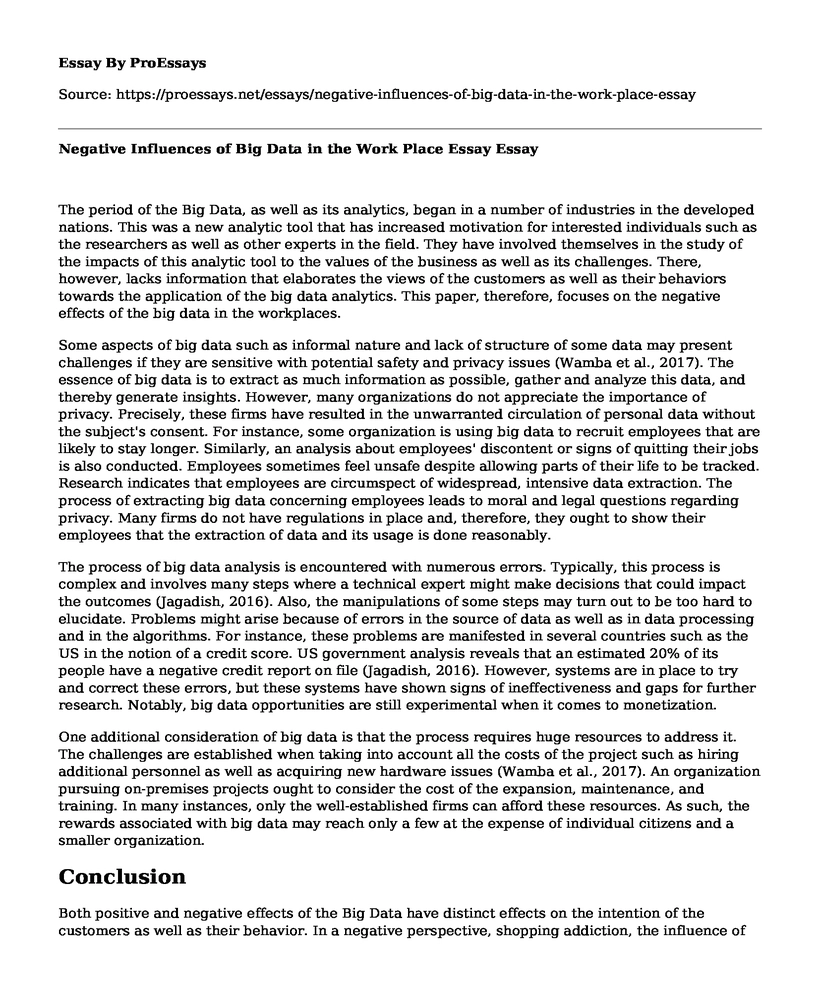The period of the Big Data, as well as its analytics, began in a number of industries in the developed nations. This was a new analytic tool that has increased motivation for interested individuals such as the researchers as well as other experts in the field. They have involved themselves in the study of the impacts of this analytic tool to the values of the business as well as its challenges. There, however, lacks information that elaborates the views of the customers as well as their behaviors towards the application of the big data analytics. This paper, therefore, focuses on the negative effects of the big data in the workplaces.
Some aspects of big data such as informal nature and lack of structure of some data may present challenges if they are sensitive with potential safety and privacy issues (Wamba et al., 2017). The essence of big data is to extract as much information as possible, gather and analyze this data, and thereby generate insights. However, many organizations do not appreciate the importance of privacy. Precisely, these firms have resulted in the unwarranted circulation of personal data without the subject's consent. For instance, some organization is using big data to recruit employees that are likely to stay longer. Similarly, an analysis about employees' discontent or signs of quitting their jobs is also conducted. Employees sometimes feel unsafe despite allowing parts of their life to be tracked. Research indicates that employees are circumspect of widespread, intensive data extraction. The process of extracting big data concerning employees leads to moral and legal questions regarding privacy. Many firms do not have regulations in place and, therefore, they ought to show their employees that the extraction of data and its usage is done reasonably.
The process of big data analysis is encountered with numerous errors. Typically, this process is complex and involves many steps where a technical expert might make decisions that could impact the outcomes (Jagadish, 2016). Also, the manipulations of some steps may turn out to be too hard to elucidate. Problems might arise because of errors in the source of data as well as in data processing and in the algorithms. For instance, these problems are manifested in several countries such as the US in the notion of a credit score. US government analysis reveals that an estimated 20% of its people have a negative credit report on file (Jagadish, 2016). However, systems are in place to try and correct these errors, but these systems have shown signs of ineffectiveness and gaps for further research. Notably, big data opportunities are still experimental when it comes to monetization.
One additional consideration of big data is that the process requires huge resources to address it. The challenges are established when taking into account all the costs of the project such as hiring additional personnel as well as acquiring new hardware issues (Wamba et al., 2017). An organization pursuing on-premises projects ought to consider the cost of the expansion, maintenance, and training. In many instances, only the well-established firms can afford these resources. As such, the rewards associated with big data may reach only a few at the expense of individual citizens and a smaller organization.
Conclusion
Both positive and negative effects of the Big Data have distinct effects on the intention of the customers as well as their behavior. In a negative perspective, shopping addiction, the influence of the group, privacy as well as security matters influence greatly on the behaviors as well as the intentions of the customers. A customer who reveals inactiveness may intend to search for information. Security as well as the privacy of the customer plays a key role in their influence on the intentions but plays a lower role in the behaviors of the same customers.
E-commerce has the capability of identifying the security of the customers as well as detection of Fraud through the Big Data analytics. As such, security and privacy are not a major concern by the customers in the negative application of Big Data analytics. This paper has shown that the effects of the value of the commodity as well as the shopping habits have a negative impact on the influence of customers on security and privacy. This raises to concern on the e-vendors that realizes that the addictions of shopping habits are beneficial on the Big Data analytics and their applications and therefore the customers should control themselves in the addictions.
References
Jagadish, H. V. (2016). The Values Challenge for Big Data. Bulletin of the IEEE Computer Society Technical Committee on Data Engineering, 77-84.
Kaisler, S., Armour, F., Espinosa, J. A., & Money, W. (2013, January). Big data: Issues and challenges moving forward. In System Sciences (HICSS), 2013 46th Hawaii international conference on (pp. 995-1004). IEEE.
Wamba, S. F., Gunasekaran, A., Akter, S., Ren, S. J. F., Dubey, R., & Childe, S. J. (2017). Big data analytics and firm performance: Effects of dynamic capabilities. Journal of Business Research, 70, 356-365.
Woo, S. (2017, March 13). In Search of a Perfect Team at Work. Retrieved from https://www.wsj.com/articles/in-search-of-a-perfect-team-at-work-1489372003
Cite this page
Negative Influences of Big Data in the Work Place Essay. (2022, Sep 22). Retrieved from https://proessays.net/essays/negative-influences-of-big-data-in-the-work-place-essay
If you are the original author of this essay and no longer wish to have it published on the ProEssays website, please click below to request its removal:
- Evaluation Essay on CompTech Computer Repair Shop
- Essay Example on Internet Usage: An Unstoppable Force in the Digital Age
- Paper Example on Move to Higher Price: Lower Sales & Lower Royalties?
- Essay Example on Citi Trends: Home-Oriented Shopping for Middle-Class Urban Customers
- Brand Affects Consumers' Choices: What It Means to Adolescents - Essay Sample
- Happy Cow Digital Marketing Layout: Crafting an Effective Plan - Essay Sample
- Essay Example on Organizational Performance: The Impact of Work Pace







